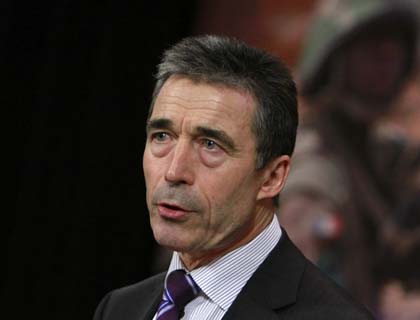KABUL - NATO Secretary General Anders Fogh Rasmussen indicated that a potential Pakistani blockade of the alliance's supply lines into Afghanistan would not be in Pakistan's interest.
Following the Friday's U.S. drone that killed Pakistani Taliban leader, Hakimullah Mehsud, a number of Pakistani politicians said the attack threatened to derail peace talks with insurgents. Imran Khan, the leader of Tehreek-e-Insaf, the party that governs Khyber-Pakhtunkhwa Province, helped pass a resolution on Monday that threatened to block the supply lines through the region if drone strikes did not stop by November 20.
"I feel confident that the Pakistani authorities will maintain opened supply routes and transit routes because it is in Pakistan's own interest to contribute positively to stability and security in the region," Rasmussen said.
Hakimullah Mehsud, who had a $5 million U.S. bounty on his head, was killed by a U.S. drone strike in the northwestern Pakistani militant stronghold of North Waziristan, near the Afghan border.
The Pakistani government denounced Mehsud's killing as a U.S. attempt to derail the talks and summoned the U.S. ambassador on Saturday to complain.
Pakistan is the main route for supplies for U.S. troops in landlocked Afghanistan, for everything from food and drinking water to fuel, and the closure of the routes could be a serious disruption as U.S. and other Western forces prepare to withdraw from Afghanistan by the end of next year.
Ironically, an unintended consequence of Khan's blockade therefore could be that it would prolong the presence of foreign troops in the area. After all, the supply lines being used by NATO are seeing with growing frequency the withdraw of supplies, not delivery.
Relations between the U.S. and Pakistan have been seriously strained several times in recent years, especially in 2011, when U.S. forces killed al Qaeda mastermind Osama bin Laden in a raid that Pakistan said violated its sovereignty.
On Monday, U.S. secretary of state John Kerry suggested that the attack that killed the Pakistani Taliban leader, Hakimullah Mehsud, was justifiable but added that Washington was sensitive to Pakistan's concerns after Islamabad denounced the raid as a blow to peace talks.
Hakimullah Mehsud, who took over as the leader of the al Qaida-linked Pakistani Taliban in 2009, was linked by U.S. intelligence to the Times Square bombing plot.
Prime Minister Nawaz Sharif, speaking in Islamabad, said the drone attack had done "serious damage" to the Pakistan government's efforts at a dialogue with the Taliban militants. Referring to recent contacts with the Taliban, Sharif said that two-way communications had started and "the ice was melting" between the government and the militants.
Nevertheless, Sharif and his fellow officials in Islamabad have not offered open support for a potential supply line blockade in the tribal belt area. The November 20 deadline of Khan's resolution gives Sharif and his brain trust more time to find a solution that would please leaders in the northwest as well as minimize damage to relations with the U.S. and NATO. (Tolo News)

